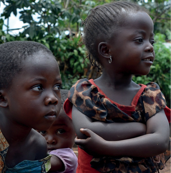Common threads project : the art and science of effective trauma treatment
Résumé
Common Threads Project (CTP) (Kamba Moja in DRC) is an effective model of survivor-centered, culturally responsive intervention targeted at the whole person (body/emotions/mind/social relations/spirit) and providing a community of support for SGBV survivors. To address the complex psychological consequences of sexual brutality, integrative group treatment provides an antidote to the shame, self-blame and stigma associated with SGBV.
Neuroscientific research confirms that during traumatic experience, verbal processing constricts, while visual and sensorimotor processing heightens to ensure survival.[1] This finding supports the use of creative non-verbal approaches to trauma treatment, in order to access the experience where it is stored: in images, in the body, and in behavior.[2]
Pilot projects of CTP have been conducted in Ecuador, Nepal, Bosnia-Herzegovina and at Fondation Panzi, DRC. Preliminary studies show significant positive impact: reduction of mental health symptoms, somatic complaints, stigma and self-blame, improvements in functioning level, social relationships, coping skills, self-worth, sense of agency, and personal empowerment. Further research is needed to rigorously test efficacy and refine the model.
Presentation includes description of methodology, images of story cloths made by women in CTP circles, discussion of clinical cases, and qualitative/quantitative research findings.
[1] Van der Kolk, B. (2014) The Body Keeps the Score: Brain Mind and Body in the Healing of Trauma. New York: Viking.
[2] Rothschild, B. (2000) The Body Remembers: The Psychophysiology of Trauma and Trauma Treatment. New York: WW Norton.
[3] Common Threads video: https://vimeo.com/84129707. The short video shows the textile work of women who have survived atrocities in Colombia, Peru, Democratic Republic of Congo, Bosnia, Zimbabwe, Laos, and Chile. The powerful artwork the women have produced on cloth speaks to us not only of their pain, but also of resilience and strength. Through it they find a way to speak to one another and to the world about their experiences and activate their capacity for coping with what has happened to them.
[4] Rachel Cohen, “Common Threads: a recovery programme for survivors of gender based violence,” Intervention: International Journal of Mental Health, Psychosocial Work, and Counseling in Areas of Armed Conflict, July 2013.

